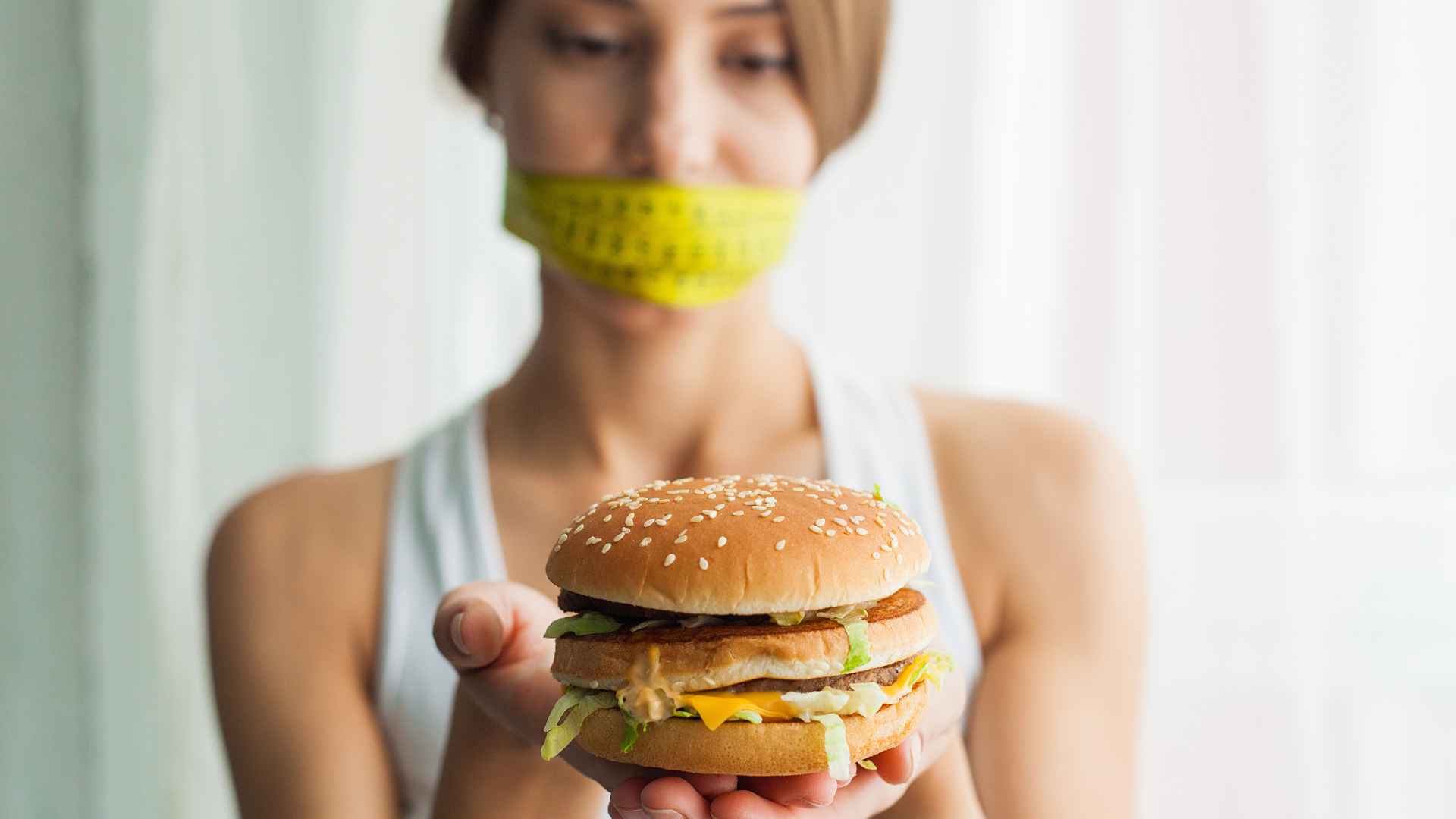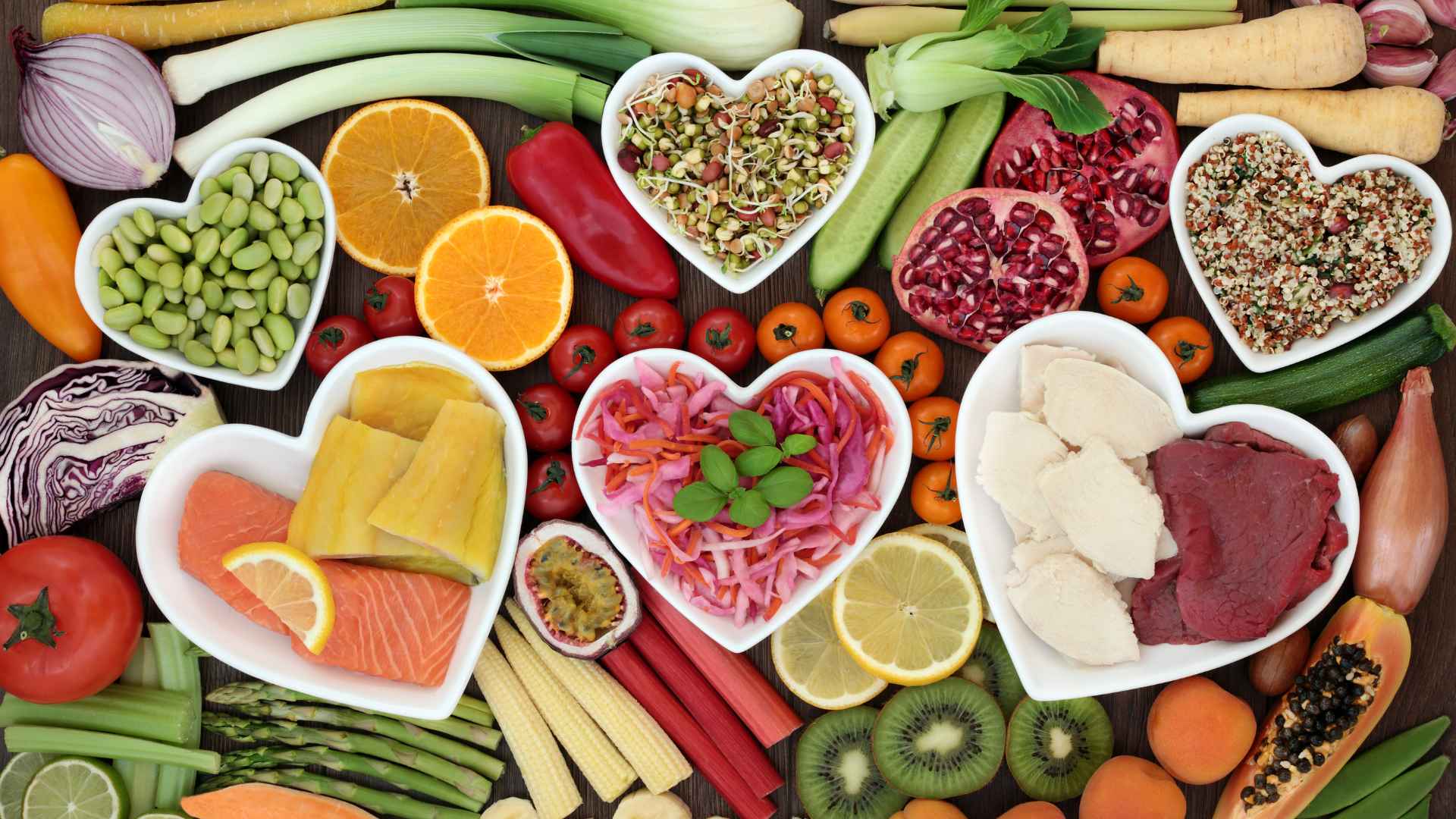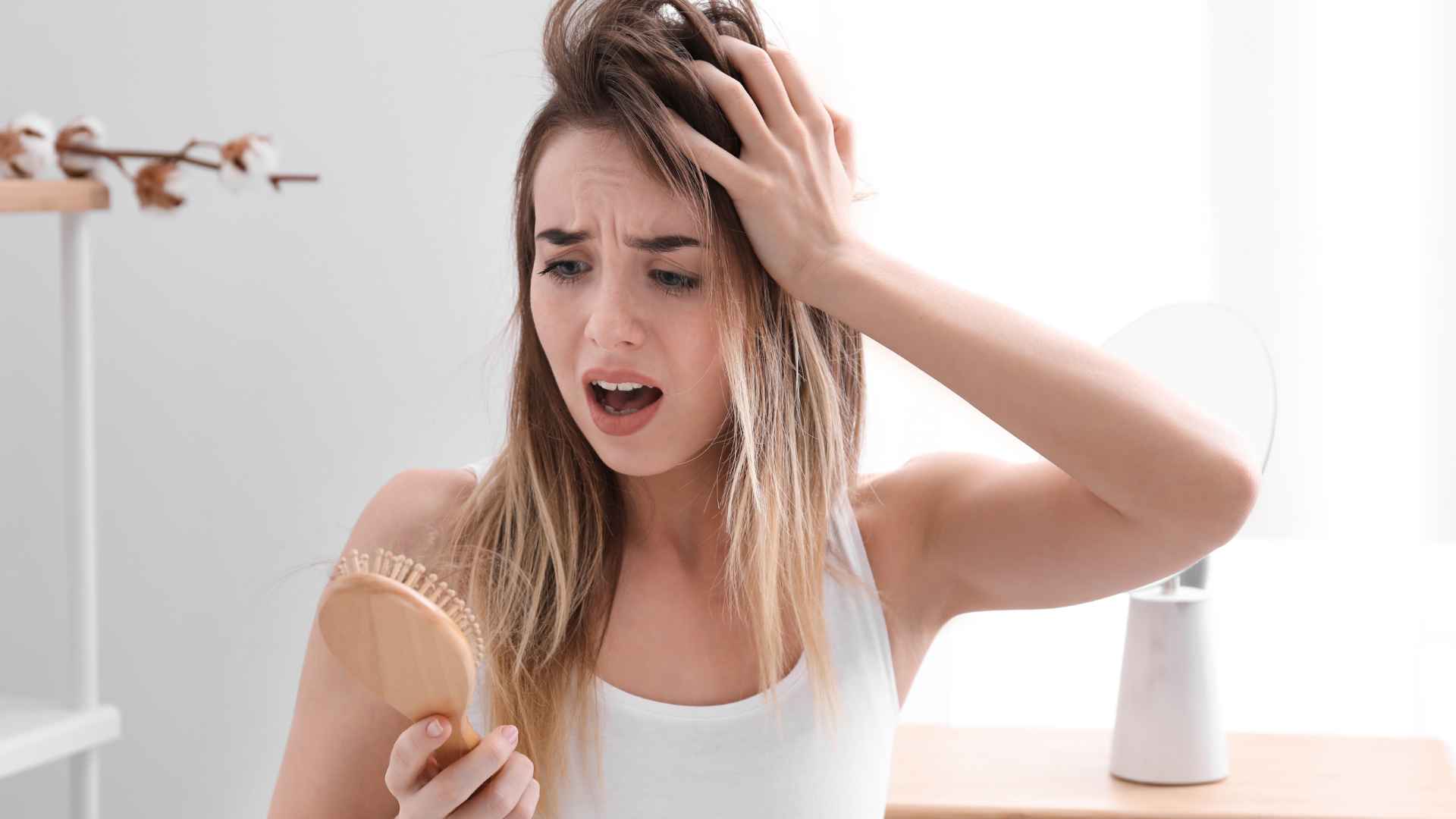Are you curious about the impact of your diet on the health of your hair? Many people wonder if what they eat can affect hair health and even prevent hair loss. In this article, we will delve into the relationship between nutrition and hair health, exploring how certain foods can promote strong and vibrant hair while potentially preventing hair loss.
Our goal is to shed light on the connection between your diet and your crowning glory, empowering you with knowledge about the nutrients that contribute to healthy hair. So, let’s explore the world of nutrition and its role in promoting luscious locks!
The Importance of Nutrition for Healthy Hair

Proper nutrition is a fundamental pillar of overall hair health. Just like other parts of our body, hair follicles require essential nutrients to function optimally and promote healthy hair growth, strength, and maintenance. When our bodies receive the right mix of vitamins, minerals, proteins, and healthy fats, it positively influences the condition and appearance of our hair.
Vitamins like Biotin (Vitamin B7), Vitamin C, and Vitamin E play crucial roles in supporting hair growth and maintaining the health of hair follicles. Minerals such as Iron, Zinc, and Selenium are essential for healthy hair, as they help transport oxygen and nutrients to the scalp, promoting hair growth and preventing hair loss.
Furthermore, proteins are the building blocks of hair, and a diet rich in protein contributes to strong and resilient hair strands. Omega-3 fatty acids, found in healthy fats like those from fish and nuts, nourish the scalp and support hair health, ensuring that hair looks its best.
Overall, a balanced diet that provides these essential nutrients can have a positive impact on hair health, promoting stronger, shinier, and more vibrant locks.
Key Nutrients That Play a Vital Role in Promoting Hair Growth and Preventing Hair Loss
Several nutrients are essential for promoting hair growth and preventing hair loss. Here are some key nutrients and their roles in maintaining healthy hair:
- Protein: Protein is a crucial nutrient for hair health as hair strands are composed mainly of a protein called keratin. Adequate protein intake supports the production of keratin, promoting strong and resilient hair growth.
- Biotin (Vitamin B7): Biotin is often associated with hair health, as it plays a vital role in the metabolism of amino acids, the building blocks of proteins. Biotin supports the growth of hair and may help prevent hair thinning and loss.
- Vitamin C: Vitamin C is an antioxidant that supports collagen production, which is essential for hair structure and strength. It also aids in the absorption of iron, another important nutrient for hair health.
- Iron: Iron is responsible for transporting oxygen and nutrients to the hair follicles. Insufficient iron levels can lead to hair loss, as it disrupts the hair growth cycle.
- Zinc: Zinc is involved in various cellular processes, including hair follicle health and hair growth. It helps maintain the oil-secreting glands on the scalp, which can impact hair health.
- Omega-3 Fatty Acids: Omega-3 fatty acids have anti-inflammatory properties and help nourish the hair follicles and scalp, promoting healthy hair growth.
Incorporating a variety of nutrient-rich foods into your diet can provide these essential vitamins and minerals, supporting healthy hair growth and preventing hair loss. Foods like lean meats, fish, eggs, nuts, seeds, leafy greens, citrus fruits, and whole grains are excellent sources of these nutrients. A well-balanced diet that includes a wide range of these nutrients is essential for maintaining strong, vibrant, and lustrous hair.
Foods Good for Hair Loss Prevention
Here is a list of hair-friendly foods and their respective nutrients that can help in preventing hair loss and promoting healthy hair growth:
Protein-Rich Foods:
- Lean Meats (chicken, turkey): Provide essential amino acids for keratin production.
- Fish (salmon, tuna): High in omega-3 fatty acids and protein, promoting scalp health and hair growth.
- Eggs: Excellent source of biotin and protein, essential for hair strength and growth.
- Legumes (beans, lentils): Rich in protein, iron, and zinc, supporting hair follicle health.
Fruits and Vegetables:
- Berries (blueberries, strawberries): Packed with antioxidants, vitamins, and minerals for a healthy scalp.
- Citrus Fruits (oranges, grapefruits): High in vitamin C, promoting collagen production and iron absorption.
- Sweet Potatoes: Rich in beta-carotene, converted to vitamin A in the body, which supports a healthy scalp and hair.
- Spinach and Kale: Excellent sources of iron and vitamins A and C, crucial for hair health.
Foods Rich in Biotin:
- Nuts (almonds, walnuts): Provide biotin and vitamin E, supporting keratin production and hair strength.
- Seeds (flaxseeds, chia seeds): High in biotin, omega-3 fatty acids, and zinc, promoting scalp health.
- Whole Grains (brown rice, oats): Contain biotin and other B vitamins that support healthy hair growth.
Iron-Rich Foods:
- Leafy Greens (spinach, kale): High in iron, which helps prevent iron deficiency-related hair loss.
- Lentils: Provide iron, protein, and zinc for strong and healthy hair.
- Fortified Cereals: Offer a good source of iron and other essential nutrients for hair health.
Foods with Omega-3 Fatty Acids:
- Fatty Fish (salmon, mackerel): Rich in omega-3 fatty acids, promoting scalp health and hair growth.
- Flaxseeds and Chia Seeds: Excellent plant-based sources of omega-3 fatty acids for hair health.
Incorporating these hair-friendly foods into your diet can support strong, vibrant, and healthy hair, while also preventing potential hair loss. Remember to maintain a balanced and varied diet to ensure you are getting all the essential nutrients your hair needs.
A Balanced Diet for Hair Health

A balanced diet is crucial for overall hair health, as it provides the necessary nutrients for hair growth and maintenance. Incorporating a variety of nutrient-rich foods into your eating plan ensures that your body receives all the essential components it needs to support healthy hair.
- Protein: Hair is primarily made of a protein called keratin. Including adequate protein sources like lean meats, fish, eggs, legumes, and dairy products ensures that your body has the building blocks necessary for hair growth and strength.
- Vitamins and Minerals: Various vitamins and minerals play key roles in maintaining healthy hair. Vitamin C aids in collagen production, which is vital for a healthy scalp. Vitamin A promotes sebum production, keeping the scalp moisturized. Vitamin E is an antioxidant that supports hair follicle health. Biotin, a B-vitamin, is essential for keratin production. Important minerals like iron and zinc are also crucial for hair growth.
- Omega-3 Fatty Acids: Omega-3 fatty acids contribute to scalp health and hydration, reducing inflammation and supporting hair growth. Incorporate fatty fish, flaxseeds, chia seeds, and walnuts into your diet to ensure an adequate intake of these essential fatty acids.
- Antioxidants: Antioxidant-rich fruits and vegetables protect the hair follicles from damage caused by free radicals, maintaining a healthy environment for hair growth. Include colorful fruits and vegetables like berries, citrus fruits, sweet potatoes, spinach, and kale in your meals.
- Hydration: Drinking plenty of water is crucial for overall health, including hair health. It helps maintain the moisture balance in the scalp and supports nutrient transport to the hair follicles.
By adopting a well-rounded and nutrient-dense eating plan, you can ensure that your body receives all the necessary components for optimal hair growth and maintenance. Additionally, maintaining a healthy lifestyle, managing stress, and avoiding damaging hair practices can further contribute to the overall health and appearance of your hair. If you have specific concerns about hair loss or hair health, consider consulting with a healthcare professional or a registered dietitian for personalized guidance.
Significance of Staying Hydrated for Healthy Hair
Staying hydrated is crucial for maintaining healthy hair, as water plays a vital role in delivering nutrients to hair follicles and ensuring proper moisture levels in the scalp.
- Nutrient Delivery: Proper hydration ensures that nutrients from the foods we eat are effectively transported to the hair follicles through the bloodstream. This nutrient supply is essential for the growth and maintenance of healthy hair. When the body is dehydrated, blood flow to the scalp may decrease, resulting in inadequate nutrient delivery to the hair follicles.
- Scalp Health: The scalp, like the skin, can suffer from dryness and flakiness when not adequately hydrated. A well-hydrated scalp maintains a healthy environment for hair growth. When the scalp is dry and irritated, it may negatively impact the hair follicles, potentially leading to weaker and more brittle hair.
- Moisture Balance: Proper hydration helps maintain the moisture balance of the hair itself. Dehydrated hair may become brittle, prone to breakage, and more susceptible to damage from heat styling or harsh hair care practices. When the hair shaft lacks moisture, it may lose its elasticity, leading to hair breakage.
To promote healthy hair, it’s essential to drink an adequate amount of water throughout the day. While individual hydration needs can vary based on factors like climate, activity level, and overall health, a general guideline is to aim for about eight 8-ounce glasses of water per day. However, this amount may need to be adjusted for each person.
In addition to drinking enough water, it’s also beneficial to maintain a balanced diet rich in water-containing foods like fruits and vegetables. These foods contribute to overall hydration and provide additional vitamins and minerals that support healthy hair.
While hydration is essential for hair health, it’s important to note that staying hydrated alone may not reverse hair loss caused by genetic or hormonal factors. If you’re experiencing significant hair loss or other concerning hair issues, it’s best to seek advice from a healthcare professional or a dermatologist to determine the underlying cause and explore appropriate treatment options.
Foods and Habits That Can Negatively Impact Hair Health
Avoiding hair-harming foods and habits is essential for maintaining optimal hair health. Certain dietary choices and lifestyle practices can negatively impact the condition of your hair. Here are some factors to consider:
- Excessive Sugar and Processed Foods: Diets high in sugar and processed foods can lead to inflammation and oxidative stress in the body. These conditions can affect hair follicles and potentially lead to hair thinning and breakage. Instead, opt for a balanced diet rich in whole foods, fruits, vegetables, and lean proteins to provide essential nutrients for hair growth.
- Unhealthy Fats: Consuming excessive unhealthy fats, such as trans fats and saturated fats found in fried foods and processed snacks, may contribute to inflammation and interfere with nutrient absorption. Healthy fats, like those found in avocados, nuts, and fatty fish, are essential for supporting hair health.
- Crash Diets and Calorie Restriction: Drastic calorie restriction and crash diets can deprive the body of essential nutrients needed for hair growth. Severe caloric deficits may lead to nutrient deficiencies, which can affect the hair growth cycle and lead to temporary hair loss. It’s essential to maintain a balanced diet that provides all the necessary nutrients for overall health, including healthy hair.
- Excessive Alcohol and Caffeine: Overconsumption of alcohol and caffeine can dehydrate the body, which may negatively impact the scalp and hair. Maintaining proper hydration is crucial for overall hair health, so it’s essential to drink alcohol and caffeine in moderation and balance them with enough water intake.
- Smoking: Smoking is known to negatively impact circulation and oxygen delivery to the scalp and hair follicles. This can affect hair growth and contribute to hair loss over time. Quitting smoking is not only beneficial for overall health but also for hair health.
- Harsh Hair Care Practices: Certain hair care practices, such as excessive heat styling, frequent use of chemical treatments, and tight hairstyles like tight ponytails and braids, can lead to hair damage and breakage. Avoiding these harsh practices and opting for gentler hair care routines can help preserve the health of your hair.
By being mindful of your diet and lifestyle habits, you can support healthy hair growth and prevent potential hair loss caused by poor nutrition and damaging practices. A balanced diet, proper hydration, and gentle hair care practices can go a long way in maintaining vibrant and healthy hair. If you’re concerned about hair loss or changes in your hair’s appearance, consulting with a healthcare professional or a dermatologist can help identify the underlying cause and provide appropriate guidance for improving hair health.
Seeking Professional Advice
Seeking professional advice is crucial for anyone with concerns about hair loss or hair health. Healthcare professionals, such as dermatologists or trichologists, can help assess the underlying causes of hair loss and recommend appropriate treatments. Additionally, consulting with a registered dietitian can provide personalized dietary advice tailored to individual health status and nutritional needs.
These professionals have the expertise to identify any deficiencies or imbalances in your diet that might be affecting your hair health. They can suggest specific foods and nutrients that will promote hair growth and provide overall health benefits. Moreover, they can address any existing health conditions or medications that might be contributing to hair loss.
Remember, each person’s body is unique, and what works for one individual may not work for another. So, seeking personalized guidance is essential to create a dietary plan that supports your hair health effectively.
By combining the expertise of healthcare professionals with a well-balanced diet, proper hydration, and gentle hair care practices, you can take a holistic approach to promoting healthy and vibrant hair. So, don’t hesitate to reach out to professionals for personalized advice and support on your journey to maintaining beautiful and strong hair.
Watch Five foods for hair loss – diet for healthy hair | Video
Top 5 FAQs and answers related to what foods are good for hair loss
What foods are good for preventing hair loss?
A balanced diet rich in various nutrients is essential for hair health. Foods high in protein, such as lean meats, fish, eggs, and legumes, support hair growth and strengthen hair strands. Additionally, fruits and vegetables containing vitamins A, C, and E, along with antioxidants, promote a healthy scalp and encourage hair growth.
Can specific vitamins or minerals help prevent hair loss?
Yes, certain vitamins and minerals play a crucial role in preventing hair loss. Biotin (vitamin B7) supports keratin production, while vitamin C aids in collagen synthesis and iron absorption. Zinc helps maintain a healthy scalp, and iron prevents iron deficiency-related hair loss. Omega-3 fatty acids also contribute to scalp health.
Are there any plant-based foods that can help with hair loss?
Yes, several plant-based foods are beneficial for hair health. Nuts, seeds, and whole grains are rich in biotin, which supports hair growth. Additionally, leafy greens, lentils, and fortified cereals provide iron, essential for preventing iron deficiency-related hair loss.
Can drinking enough water prevent hair loss?
Staying hydrated is essential for overall hair health. Water helps deliver nutrients to the hair follicles and maintains proper moisture levels in the scalp, promoting healthy hair growth.
Are crash diets and unhealthy eating habits linked to hair loss?
Yes, crash diets and unhealthy eating habits can contribute to hair loss. Severe calorie restrictions and nutrient deficiencies resulting from extreme diets may negatively impact hair health. A well-balanced diet that meets all nutritional requirements is vital for healthy hair growth.
Conclusion

In conclusion, a well-balanced diet plays a crucial role in promoting hair health and preventing hair loss. Nutrient-rich foods, such as those high in protein, vitamins, minerals, and healthy fats, are essential for supporting hair growth and maintaining strong and vibrant hair. Incorporating a variety of foods that provide key nutrients like biotin, vitamin C, iron, and omega-3 fatty acids can positively impact hair health.
Staying hydrated is also essential for delivering nutrients to hair follicles and maintaining proper moisture levels in the scalp. On the other hand, avoiding excessive consumption of sugary, processed foods, and unhealthy fats can help prevent potential harm to hair health.
While a balanced diet is vital, individual needs may vary. Therefore, it is essential to seek personalized advice from healthcare professionals or registered dietitians for specific hair loss concerns and dietary recommendations. By adopting healthy eating habits and staying hydrated, readers can prioritize their hair health and maintain luscious and resilient hair.
Please share this What Foods Are Good for Hair Loss: What to Eat and Avoid with your friends and do a comment below about your feedback.
We will meet you on next article.
Until you can read, When Does Hair Loss Start: Early Signs of Balding Guide